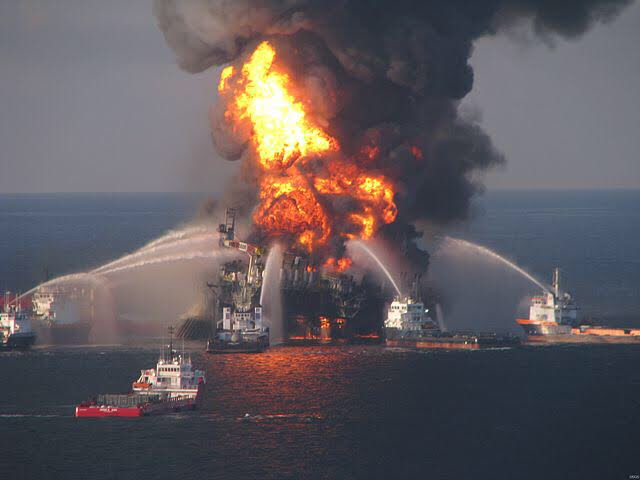Clean-up chemical at the BP Oil Spill tied to health problems
Scientists link a chemical frequently used to disperse spilled oil to wheezing, rashes and burning eyes in the recovery workers following the country's largest-ever spill.
Will Sullivan • November 8, 2017

Tugboats quell the flames on the burning Deepwater Horizon drilling platform. [Image credit: United States Coast Guard | CC 0]
The National Oceanic and Atmospheric Administration responds to about 100 oil spills each year. In each aftermath, the agency studies the effectiveness of various cleanup methods with hopes of limiting the impact of future spills on the environment and human health.
One such method is spraying the oil with the chemical Corexit, which breaks up large clumps of oil into smaller pieces, allowing wind and waves to more easily sweep it away. But Corexit has been linked to fast-developing symptoms in the 2010 Gulf of Mexico oil spill’s 30,000-person cleanup crew. These symptoms include wheezing, rashes and burning eyes, according to a recent study published in Environmental Health Perspectives in July.
It’s the first study to look at the effects of Corexit on the BP oil spill cleanup crew.
“Finding that there were acute symptoms suggests to us that we have an obligation to continue to pursue the question” of whether Corexit might have long-term health effects, says Dale Sandler, a National Institute of Health epidemiologist and the study’s principal investigator. She says the chemical might cause chronic illnesses such as asthma, lung disease and heart disease. After the April 2010 explosion that killed 11 people, the Deepwater Horizon rig spewed more than 200 million gallons of crude oil into the ocean. Tens of thousands of workers participated in the spill’s cleanup, a process expedited by the U.S. Coast Guard’s application of Corexit.
While some of the chemical components of dispersants are toxic, EPA testing determined that Corexit was less toxic than a number of other potential dispersants, Sandler explains. The chemical had been used in past cleanups, but in smaller quantities and for smaller spills.
One to three years after the BP spill, Sandler and other researchers surveyed workers exposed to Corexit, asking about current symptoms as well as any experienced during the cleanup. Even after accounting for the anticipated health effects of crude oil exposure, the researchers still found higher rates of symptoms in those exposed to Corexit than would be expected if the oil dispersant weren’t harmful.
Survey data is inherently subjective, and Sandler cautions that some of the questions require participants to recall symptoms from up to three years ago. While the researchers did weed out some unreliable reporters, it’s likely that the survey data has some inaccuracies. To gather better data, Sandler says, future studies will use more reliable methods such as blood tests and clinical diagnoses.
The fact that workers exposed to Corexit got sick is not surprising, says Samantha Joye of the University of Georgia over email. Joye has studied the Deepwater Horizon spill extensively and was not involved in Sandler’s study. Previous studies have shown Corexit harms both human cells and animals in a laboratory setting.
This is not to say that the use of Corexit resulted in more health problems than other cleanup tactics might have. Using different dispersants or burning the oil, which releases carcinogens into the atmosphere, might have been equally harmful. And while using products comes with risks, the dispersant does speed up the cleanup process, limiting air pollution and seabed damage caused by oil. Future research into the long-term health effects of Corexit will allow researchers to better weigh the costs and benefits of different cleanup strategies, Sandler says.
In the meantime, the new results can provide some answers to a community that has been worrying for years about the effects of the disaster on their well-being – although questions still remain about the longer-term health effects of Corexit exposure. “I think the people in the area deserve to have answers,” Sandler says.
1 Comment
I was in the BP oil spill clean up in the Gulf.
I have experience some health issues. I have Neuropathy in my feet. Now I have discovered that I have voltage gate potassium issues it’s to high which can lead to cancer